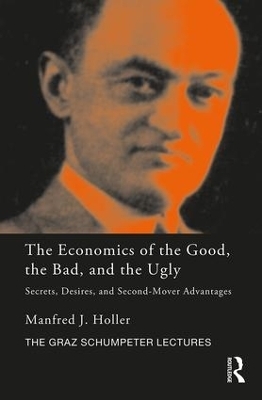
The Economics of the Good, the Bad and the Ugly
Secrets, Desires, and Second-Mover Advantages
Seiten
2018
Routledge (Verlag)
978-1-138-60698-2 (ISBN)
Routledge (Verlag)
978-1-138-60698-2 (ISBN)
In his series of Schumpeter lectures, the author uses his analysis of the three-person duel (or ‘truel’) in The Good, the Bad and the Ugly, as a starting point to argue that the truel between desires, secrets and second-mover advantages account for a large share of social problems and failures in politics and business.
The highly praised Western, The Good, the Bad, and the Ugly, has been used in many game-theory courses over the years and has also found its way into leading journals of this field. Using the rich material offered by this movie, alongside other elements from popular culture, literature and history, this book furthers this exploration into a fascinating area of economics.
In his series of Schumpeter lectures, Manfred J. Holler uses his analysis of Sergio Leone’s movie as a starting point to argue that combinations of desires, secrets and second-mover advantages trigger conflicts but also allow for conflict resolution. Many people and organizations have a desire for secrecy, and this is often motivated by a desire to create a second-mover advantage, and by undercutting the second-mover advantage of others. This book demonstrates that the interaction of these three ingredients account for a large share of social problems and failures in politics and business but, somewhat paradoxically, can also help to overcome some of the problems that result by applying one or two of them in isolation.
This book has been written for curious readers who want to see the world from a different perspective and who like simple mathematics alongside story telling. Its accessible approach means that it will be of use to students and academics alike, especially all those interested in decision making, game theory, and market entry.
The highly praised Western, The Good, the Bad, and the Ugly, has been used in many game-theory courses over the years and has also found its way into leading journals of this field. Using the rich material offered by this movie, alongside other elements from popular culture, literature and history, this book furthers this exploration into a fascinating area of economics.
In his series of Schumpeter lectures, Manfred J. Holler uses his analysis of Sergio Leone’s movie as a starting point to argue that combinations of desires, secrets and second-mover advantages trigger conflicts but also allow for conflict resolution. Many people and organizations have a desire for secrecy, and this is often motivated by a desire to create a second-mover advantage, and by undercutting the second-mover advantage of others. This book demonstrates that the interaction of these three ingredients account for a large share of social problems and failures in politics and business but, somewhat paradoxically, can also help to overcome some of the problems that result by applying one or two of them in isolation.
This book has been written for curious readers who want to see the world from a different perspective and who like simple mathematics alongside story telling. Its accessible approach means that it will be of use to students and academics alike, especially all those interested in decision making, game theory, and market entry.
Manfred J. Holler is Emeritus Professor of Economics at the University of Hamburg, Germany; research professor at the Public Choice Research Centre at Turku, Finland, and a member of the board of the Center of Conflict Resolution. He is founding editor of the European Journal of Political Economy and the journal Homo Oeconomicus (now one of its three editors-in-chief), and also serves as assessing editor or board member for a number of other journals.
Preface and alternative facts, 1. The trailer, 2. On desires, 3. Second-mover advantages, 4. Secrets: How to create and how to deal with them, 5. Justice in the end?. References. Index
| Erscheinungsdatum | 05.10.2018 |
|---|---|
| Reihe/Serie | The Graz Schumpeter Lectures |
| Zusatzinfo | 6 Tables, black and white; 17 Line drawings, black and white; 17 Illustrations, black and white |
| Verlagsort | London |
| Sprache | englisch |
| Maße | 156 x 234 mm |
| Gewicht | 453 g |
| Themenwelt | Wirtschaft ► Allgemeines / Lexika |
| Wirtschaft ► Volkswirtschaftslehre ► Mikroökonomie | |
| ISBN-10 | 1-138-60698-7 / 1138606987 |
| ISBN-13 | 978-1-138-60698-2 / 9781138606982 |
| Zustand | Neuware |
| Informationen gemäß Produktsicherheitsverordnung (GPSR) | |
| Haben Sie eine Frage zum Produkt? |
Mehr entdecken
aus dem Bereich
aus dem Bereich
die psychologischen Determinanten menschlicher Entscheidungen
Buch | Softcover (2024)
Kohlhammer (Verlag)
39,00 €
Wirtschaftszusammenhänge verstehen und mitreden können
Buch | Softcover (2023)
Wiley-VCH (Verlag)
19,99 €


